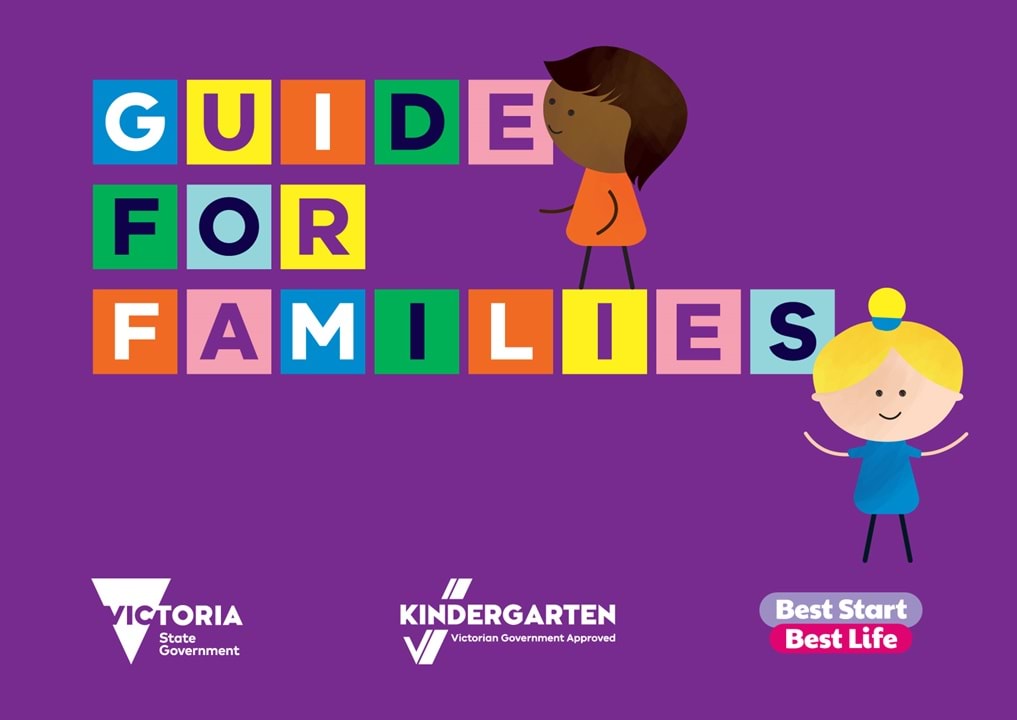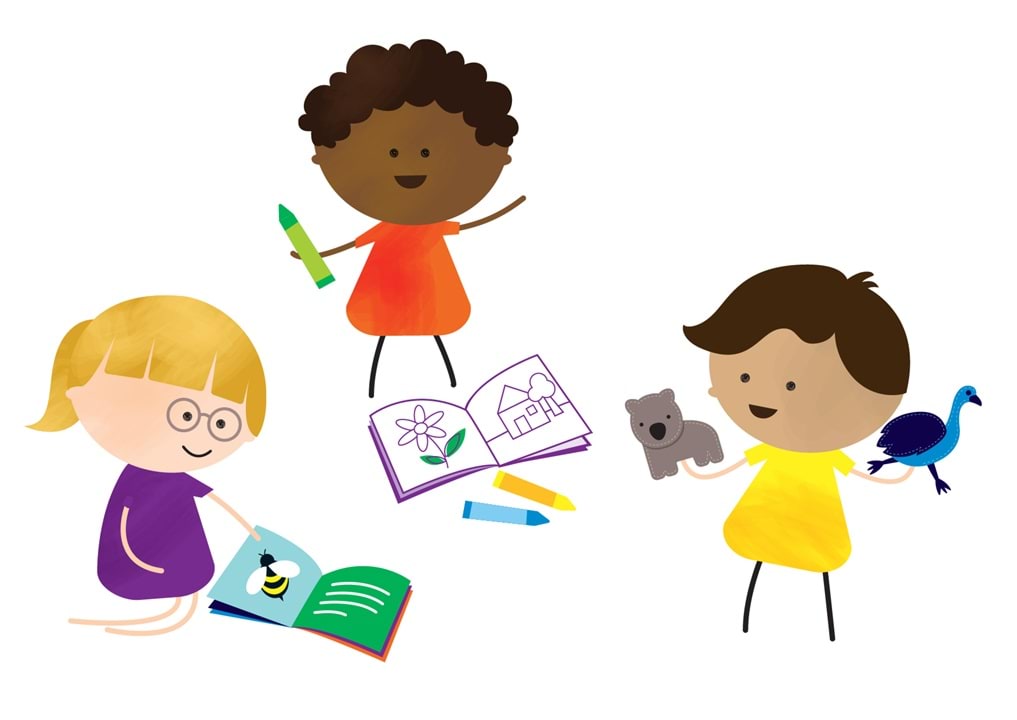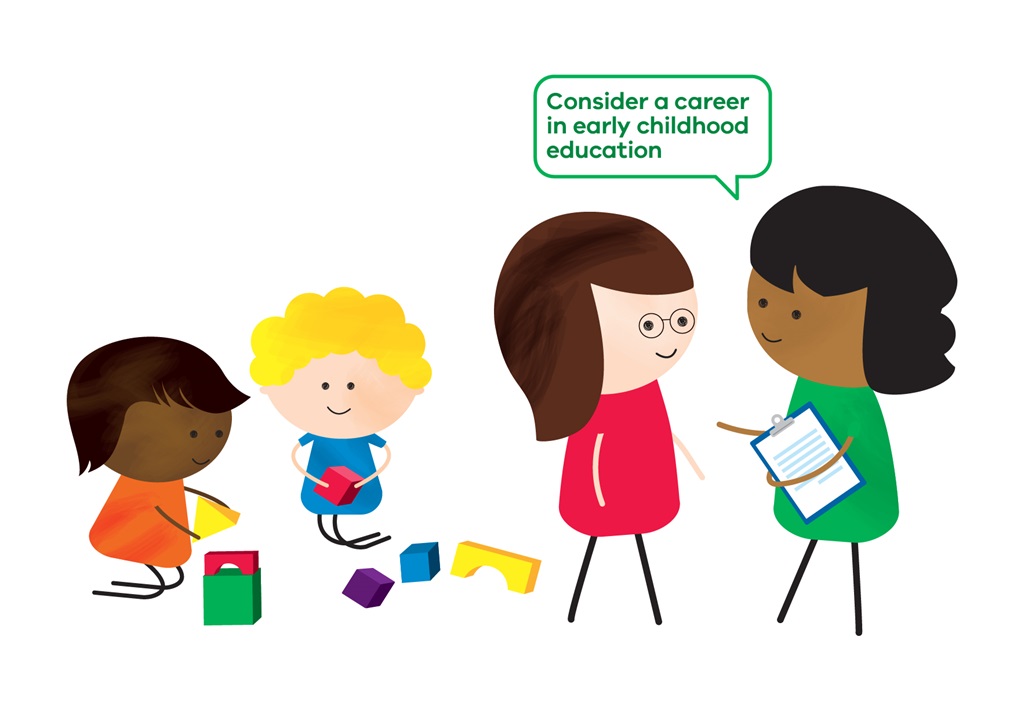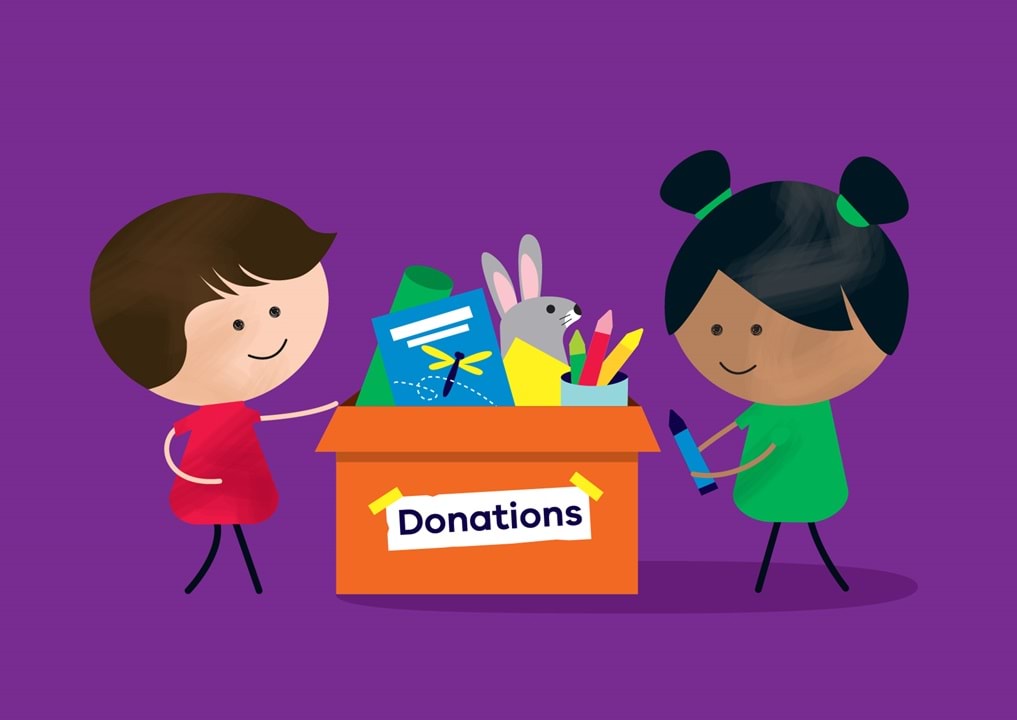Family Guide
About your Kinder Kits
Play is a fun and engaging way to support your child's learning and development. Parents, carers and families are a huge part of that journey.
Kinder Kits are filled with books, educational toys and activities made for your child and family to enjoy at home.
Each Kinder Kit includes items made especially for three-year-olds.
Victorian Early Years Learning and Development Framework
Early childhood teachers and educators support your child to grow and learn.
Kindergarten programs use the Victorian Early Years Learning and Development Framework (VEYLDF).
Everything in your Kinder Kit connects with 1 or more of the learning and development outcomes in the VEYLDF. The five outcomes are:
- Identity
- Learning
- Community
- Communication
- Wellbeing
Backpack
Kinder Kit backpacks can be used every day.
Your child can practise their drawing on the cardboard tag at the back, so they know which bag is theirs.
Unfold the backpack and secure with the Velcro tabs. Use the felt surface for imaginative play.
- Tighten or loosen the backpack straps so that the bag is sitting on your child's back.
- Create a garden with the felt stickers.
- Encourage drawing on the name tag.
- Practise pre-writing skills.
Reading
Reading is a great way to spend time together as a family. It is one of the most important ways to support literacy development.
Sharing a regular story-time with your child will help develop their imagination and vocabulary.
- Choose a book together.
- Find a cosy place to settle in and read.
- Give them space to offer their ideas about what might come next in the story.
- Use different voices.
Drawing and mark making
Drawing and mark making allow children to express themselves creatively. By experimenting with crayons on paper, children:
- develop fine motor skills, which is important for learning how to write
- improve their hand-eye coordination
- learn about colours, shapes, patterns and lines
- express creativity
- communicate with others.
- Encourage your child to enjoy the process of drawing. Drawing can help build self-confidence.
- Talk as you draw.
- Notice colours and shapes and name them.
Creative activities
Creative play stimulates all 5 of your child's senses - sight, smell, hearing, touch and taste. It is a fun way to explore, discover and learn about the world around you.
- Encourage practising resilience when stacking blocks. If they fall, your child can take 3 deep breaths and try again.
- Try rolling the playdough into a ball, make shapes, flatten it, squish it.
- Make music together. Create different rhythms and beats by clapping your hands or tapping on items you have at home.
Outdoor play
Supervised outdoor play is a big part of growth, development and wellbeing for your child.
Children can:
- explore and develop a relationship with science by learning about nature
- gain a sense of freedom
- socially interact with other children
- explore and learn how to make good choices when playing
- develop whole body movement, hand-eye coordination and fine motor and creativity skills.
- Talk about leaves and name the different colours and shapes.
- Plant seeds together.
- Connect with nature. Talk about protecting our environment.
- Build sandcastles together.
Dramatic play
Dramatic play encourages children to act out imaginary stories and take on the roles of other characters.
Children use dramatic play to practise important language and social skills, including:
- exploring and creating new worlds
- sharing and taking turns
- ways of interacting and negotiating with each other.
- Name the animals in English and other languages.
- Create characters.
- Make up stories.
- Use puppets to explore and express feelings and different emotions.
Games
Playing games with family and friends is a great way to build your child's social skills.
Games can help children learn numeracy, language and problem solving skills.
- Learn game rules and practise taking turns.
- Practise problem solving and memory skills.
- Discuss numbers and practise counting with objects.
Building community
Play is how children discover and learn about themselves and the world around them. For children, play and learning go hand in hand. The items in your Kinder Kit support you to have conversations about diversity and different cultures.
- Talk to your child about other countries and their native animals.
- Look at a map of the world to see where different languages originate.
Respecting identity
Encouraging children to learn about all cultures builds understanding, acceptance and pride. Aboriginal and Torres Strait Islander cultures, and here in Victoria, Koorie cultures, are living and thriving today. We are proud to celebrate them as authors and artists in the Kits.
Here are some activities that help your child learn more about Koorie traditions and cultures:
- Learn Koorie symbols for objects or animals.
- Learn and talk about Koorie cultures, leaders and heroes.
- Discover the importance of an Acknowledgement of Country.
Visit the Victorian Aboriginal Education Association Inc. website for fun, engaging activities that explore Koorie traditions and cultures.
Books in Auslan
Auslan is the sign language used in Victoria's Early Childhood Language Program. This program is available in some Four-Year-Old Kindergartens.
There are many benefits to children learning another language at a young age, including:
- increased pre-reading and pre-writing skills
- cognitive flexibility
- boosting self-esteem and wellbeing
- strengthened cultural identity.
Many of the books included in the 2025 Kinder Kits have Auslan translations available.
- Express feelings through Auslan.
- Say hello in Auslan.
Wellbeing and extra support
All children learn differently and at their own pace. Kinder Kits offer your child books and educational toys that can be used in lots of different ways to challenge all abilities.
If you or your child need extra support, help is available through the following avenues:
- Early childhood teachers have the skills and knowledge to help. Talk to your child’s early childhood teacher about your questions.
- Make an appointment to see your doctor or maternal and child health nurse to discuss your questions.
Careers in Early Childhood Education
Consider starting a career in Victoria's growing kindergarten sector. To support you to become an early childhood teacher or educator, there are:
- flexible study options
- generous scholarships
- financial incentives.
Donating your Kinder Kit
Donating suitable items is important for sustainability.
Once your child has finished with their Kinder Kit items you can donate them to a charity.
When deciding if an item can be donated, ask yourself if you would give this to a friend. If the answer is yes, then it is appropriate to give to charity.
Updated














